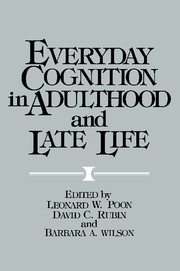Book contents
- Frontmatter
- Contents
- List of contributors
- Preface
- Part I Adult cognitive abilities in the laboratory and in real-life settings: Basic theoretical and methodological issues
- Part IA Systematic approaches to laboratory and real-world research
- Part IB Combining laboratory and real-world research
- Part II Cognition in adulthood and late life: Findings in real-life settings
- Part IIA Everyday cognitive abilities
- Part IIB Concomitant influences
- 21 Motivation and aging
- 22 Questionnaire research on metamemory and aging: Issues of structure and function
- 23 The importance of awareness in memory aging
- 24 Age and expertise: Responding to Talland's challenge
- 25 World-knowledge systems
- 26 Comments on aging memory and its everyday operations
- Part III Cognitive enhancement and aging: Clinical and educational applications
- Part IIIA Issues and perspectives
- Part IIIB Enhancement approaches
- Part IIIC Designing programs for cognitive rehabilitation
- Subject index
- Author index
25 - World-knowledge systems
Published online by Cambridge University Press: 05 October 2013
- Frontmatter
- Contents
- List of contributors
- Preface
- Part I Adult cognitive abilities in the laboratory and in real-life settings: Basic theoretical and methodological issues
- Part IA Systematic approaches to laboratory and real-world research
- Part IB Combining laboratory and real-world research
- Part II Cognition in adulthood and late life: Findings in real-life settings
- Part IIA Everyday cognitive abilities
- Part IIB Concomitant influences
- 21 Motivation and aging
- 22 Questionnaire research on metamemory and aging: Issues of structure and function
- 23 The importance of awareness in memory aging
- 24 Age and expertise: Responding to Talland's challenge
- 25 World-knowledge systems
- 26 Comments on aging memory and its everyday operations
- Part III Cognitive enhancement and aging: Clinical and educational applications
- Part IIIA Issues and perspectives
- Part IIIB Enhancement approaches
- Part IIIC Designing programs for cognitive rehabilitation
- Subject index
- Author index
Summary
Definition of world knowledge
I distinctly remember an event that took place when I was a graduate student. I was giving an older gentleman in a retirement home the Information subtest of the Wechsler Adult Intelligence Scale (Wechsler, 1955) and asked the question, “How far is it from Paris to New York? ” My respondent waited a moment and then said in a steady and deliberate voice, “Well, Lindbergh flew there in about 36 hours, with an average air speed of about 100 m.p.h., so I'll say that it's about 3600 miles. ” His response surprised me, for I had asked many younger adults this question, but had never encountered either this level of accuracy or this particular approach to deriving the answer. This older gentleman had retrieved facts from what appeared to be an impressive base of knowledge about his life and world (i.e., “world knowledge ”) and additionally had created a new piece of information to be retained for future use. Three interrelated questions immediately came to mind: (1) How is this knowledge base created? (2) What processes influence the utilization of this knowledge base? (3) How does human aging influence these mental structures and processes? The search for answers to these questions has led to a series of studies in a relatively new but rapidly growing area of research.
- Type
- Chapter
- Information
- Everyday Cognition in Adulthood and Late Life , pp. 457 - 482Publisher: Cambridge University PressPrint publication year: 1989
- 5
- Cited by

